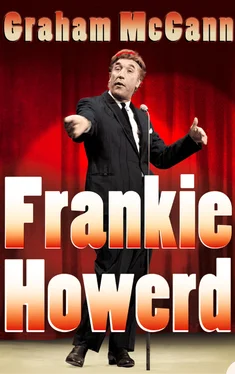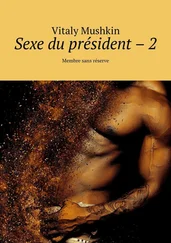The next thing that Howard did was to appear to liberate the Netherlands. As usual, it happened by accident.
The Germans were in the process of capitulation, and, on 5 May 1945, a convoy of Allied vehicles was due to set off from Brussels to enter the Dutch legislative centre. When the dawdling Howard was urged to hurry up and get into one of the cars, he chose, without the slightest hesitation, the one right at the front: âIt seemed logical.â 50 At some point en route , however, all of the vehicles lining up behind fell foul of navigational errors and disappeared from sight, leaving Sergeant Frankie Howard to enter The Hague alone in a chauffeur-driven staff car and be mobbed by a mass of grateful citizens (âthe most appreciative audience Iâve ever had!â 51 ).
As this surreal little period continued, Howard was sent with a young Army Captain to Stade, near Hamburg, to form a two-man Military Government. The Captain, facing one taxing challenge too many, promptly suffered a nervous breakdown, leaving a panicky Howard to tap out a signal for help. Reinforcements duly arrived, swelling the risibly under-manned Government of two to a risibly over-manned Government of 200. Howard, relieved to find that his services were no longer urgently needed, redirected his efforts towards the far happier task of entertaining.
He organised yet another concert party. He tried, unsuccessfully, to inveigle a fleeting appearance in a movie â Basil Deardenâs The Captive Heart â that he heard was being shot further âup the roadâ in the British Occupation Zone. He performed the occasional one-man show. He did all of the things that he most enjoyed being able to do.
As far as Howardâs Commanding Officer was concerned, he was pushing at an open door. During the summer of 1946, the War Office began a process whereby all of the old individual service entertainment bodies â including ENSA, Stars in Battledress , Ralph Readerâs RAF Gang Shows and the many and various concert parties â were gradually merged to form a new, all-embracing, post-war organisation called the Combined Services Entertainment unit (or âCSEâ for short). With more than thirty separate shows to stage, the need for new talent was acute, and Howardâs CO, hearing that the next audition was about to be held in nearby Nienburg, urged the obsessive performer to travel there and try his luck. âWith my record,â groaned Howard, âIâll be back tomorrow.â His CO was more sanguine: âMaybe youâll be lucky this time.â 52
Howard drove there in a lorry. Although he had not applied for an audition, he managed to get his name added to the list, and just after lunch, before there had been any time for the customary build-up of nerves, he was instructed to take his turn in front of the judges.
There were two people in particular whom he had to impress. One was the officer in charge of CSE productions in Germany and Austria, Major Richard Stone: a former actor who would go on to become one of Britainâs leading theatrical agents. 53 The other was Stoneâs assistant, Captain Ian Carmichael: a RADA graduate with a long and illustrious performing career ahead of him. 54
Howardâs routine revolved, somewhat idiosyncratically, around an old Ella Fitzgerald number called âA-Tisket, A-Tasketâ. Holding a slightly bent, smouldering Woodbine between the first two fingers of his shaky right hand, he interspersed the verses â
A-tisket, a-tasket
A brown-and-yellow basket I sent a letter to my mummy
On the way I dropped it.
I dropped it, I dropped it Yes on the way I dropped it A little girlie picked it up And put it in her pocket.
â with his usual brand of rambling interjections, before bringing the song screeching to a close:
Tisket, tasket, I lost my yellow basket
Oh someone help me find my basket
Make me happy again, again.
(Was it red?) No, no, no, no!
(Was it brown?) No, no, no, no!
(Was it blue?) No, no, no, no!
No, just a little yellow basket
A little yellow basket! 55
âThank you very much,â Major Stone said with the standard politely inscrutable smile, and then, once Howard had departed from the hall, he turned to solicit the views of his number two. âOh no, no,â sighed Captain Carmichael, âheâs too raw, with no timing, and I donât think heâs particularly funny.â 56 Stone, sensing a negative, invited his colleague to clarify his position. âI thought,â Carmichael replied with a grimace, âthat he was death-defyingly unfunny.â 57 Stone, however, disagreed: âI think youâve got it wrong. Iâm going to book him for one of our shows.â 58
Howard was duly installed as the compère of a concert party â The Waggoners â that was touting north-west Germany. For the next three months or so, from the end of 1945 to a short time after the start of 1946, he was in his element. Moving rapidly from place to place, he acquired a clearer sense of what it took to win over any audience, and he adapted his act accordingly. He improved the best of his old routines; dropped the rest; wrote, tried and tested several new jokes, sketches and monologues; and generally grew in confidence as a performer.
Those who watched him were impressed. One such admirer was a 21-year-old soldier and budding comedian named Benny Hill. Serving in Germany at the time with the Royal Electrical and Mechanical Engineers, Hill was struck immediately by Howardâs edgy originality, and made a point of seeking him out in the canteen shortly after the show had finished.
It was a brief but revealing meeting between two of British comedyâs most significant stars of the future: Hill, the self-assured optimist, and Howard, the insecure pessimist. âYouâve got a jolly good way with you,â gushed Hill, believing Howard (who was seven years his senior) to be a relatively seasoned professional. When it became clear that he was actually lavishing praise on a surprisingly shy and modest amateur, Hill urged him to consider pursuing comedy as a career: âYou ought to take it up,â he insisted. âI think you would do very well.â 59
Howard, blushing a little and fidgeting with his curly hair, mumbled a clumsily non-committal response â âI donât know, really, you knowâ â but he was genuinely touched by the encouragement. 60 Indeed, having endured so many curt rejections up to this point in his life, he treasured every single one of the kind words that he now received.
Richard Stone, for one, would discover just how true this was some thirty-five years later, when the star Frankie Howerd, upon hearing a specious rumour that Stone had only grudgingly found a place for him in CSE, asked his former boss to meet him as soon as possible for lunch. âIt turned out,â recalled Stone (who had secretly been hoping that the reason for the meeting was to sound him out about acquiring Howerd as a client), âthat in all the years, through his many ups and downs, he had consoled himself with the thought that there was at least one man in show-business who believed in him. He then produced from his pocket a tired piece of Army notepaper which he had cherished. It informed those whom it might concern that Sergeant Howard was a very funny man, and was signed Richard Stone, Major!â 61 The insecurity would never go away.
Throughout that short tour during the winter of 1945/46, however, Howard was a relatively happy young man. The fears of wartime were finally over, and the anxieties of peacetime had not yet begun. All that he was required to do â and all that he needed to do â was perform, and he relished every minute. Then, with the arrival of April 1946, the brief but blessed interlude was brought abruptly to a close. Frankie Howard, after spending six years in uniform, was demobbed, and he returned to civilian life.
Читать дальше












